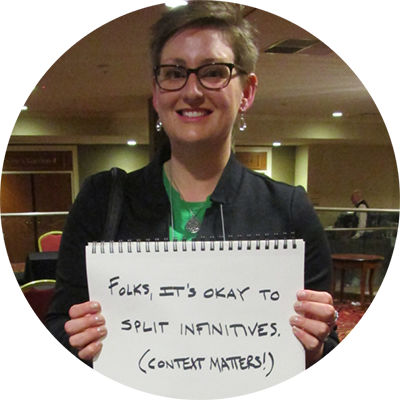BuzzFeed, Editing Peeves, and Split Infinitives
What—editors have grammar and style peeves?
You must be shocked.
Emmy Favilla from BuzzFeed asked ACES2015 attendees to write down their editing peeves as they relate to grammar or usage and used them to create a whiteboard post. As you may suspect, she had an eager audience. Even I made it on there.
I’ve got a thing about people who arbitrarily enforce a “no split infinitives!” rule. If you’ve worked with a stickler (or had a particularly strict fifth-grade teacher), you know what I’m talking about. So does Bryan Garner:
H.W. Fowler divided the English-speaking world into five classes: (1) those who neither know nor care what a split infinitive is; (2) those who do not know, but care very much; (3) those who know and condemn; (4) those who know and approve; and (5) those who know and distinguish. It is this last class to which, if we have a good ear, we should aspire.
Amen. We split infinitives all the time in common speech, even though misinformed grammarians prescribe against it, especially in formal writing. (This prescription usually exists because they’re afraid someone else will think you’re wrong, not because you’re actually wrong.) I’ve worked jobs that required me to recast sentences, or awkwardly rearrange words, to avoid splitting an infinitive. The reality? Unless splitting an infinitive makes your sentence weird or changes the meaning, there’s no reason to tie yourself in knots avoiding it. (Context matters!)
I suppose I should step back. What are infinitives? Infinitives are verb forms commonly used in conjunction with the word “to” or another auxillary verb (e.g., to go, can go, to examine). They can assume characteristics of nouns and verbs, and form phrases in association with objects and modifiers. These phrases can work as nouns, adjectives, or adverbs in a sentence.
She needs to go to the store.
I offered a solution to solve world hunger.
They are taking a class to understand the complexities of grammar.
Splitting an infinitive is when you jam something—usually an adverb—between the two parts of the verb.
She needs to quickly go to the store.
I offered a solution to comprehensively solve world hunger.
They are taking a class to better understand the complexities of grammar.
If you can move the adverb (or whatever’s jamming the infinitive) to the end of the sentence or phrase without getting goofy, do it. Here, moving “quickly” to the end of first example sentence produces an awkward construction: “She needs to go to the store quickly.” While it’s not wrong, per se, it’s close to suggesting that the subject, needs to get to the store—STAT! Here, the writer might be better off recasting for clarity: “She needs to stop at the store for a minute.”
If we changed the second sentence to “I comprehensively offered a solution to solve world hunger,” we’ve altered the meaning of the sentence. In the original, the solution will completely solve world hunger. In the second, we imagine the speaker offered a solution to a global crisis in a thorough fashion.
The third sentence exemplifies a widely acceptable split infinitive; “to better understand” is a far more common construction than “to understand better.”
Consider euphony: Does the sentence with (or without) the split infinitive sound pleasing to your ear? The last thing you want to do is write or edit in a way that trips up your reader. Your audience demands clarity.
The Chicago Style Q&A offers an excellent epitaph:
…CMOS has not, since the thirteen edition (1983), frowned on the split infinitive. The sixteenth edition suggests, to take one example, allowing split infinitives when an intervening adverb is used for emphasis (see paragraphs 5.106 and 5.168). In this day and age, it seems, an injunction against splitting infinitives is one of those shibboleths whose only reason for survival is to give increased meaning to the lives of those who can both identify by name a discrete grammatical, syntactic, or orthographic entity and notice when that entity has been somehow besmirched.
Feel free to boldly go, friends.
Picture courtesy of Emmy Favilla and BuzzFeed.
